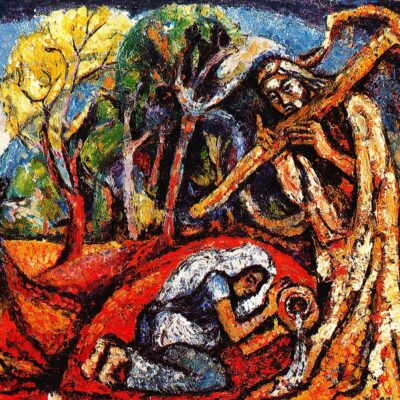by the Rev. Robert C. Laird
It’s good to be back with you today,
after spending the last couple of days
at our Diocesan Convention,
in which we passed a budget,
heard reports on the ministries of the diocese,
shared in worship with each other,
and got to see friends that we don’t often get to see.
Convention is a great time;
I think that’s one of the reasons
folks like Lavonne, who represented St. Luke’s
along with Jane,
enjoy going year after year.
It takes a special kind of person
to answer the call to that ministry,
and we’re grateful for both of the good people
who did so on our behalf.
One of the things that we heard
was the final report
of Outside Church Walls,
the Diocesan steering team
that has spent the last two years
wrestling with what it means for us to be a diocese,
and what we might do as a diocese going forward;
I have been grateful to be a part of that team,
in all the challenges and blessings we have encountered
as we have done our work together.
As Bishop Rickel recounted for the Convention on Friday,
Last May our group invited people from outside the church
to come speak to us, and tell us…
well, whatever they wanted to, really…
The most memorable moment of that day
was the end of our time with Bob.
Bon is an avowed atheist,
and was glad to share why;
he’s deeply thoughtful,
and incidentally, Bob has also done more
to make the world a better place
in the last couple of years
than a lot Christians will manage in their lifetimes.
Bob was asked if there was anything
he would offer to sum things up,
and he thought for a while,
and said, yes,
and told us the one thing that stuck with us all
more than anything else that day,
or even anything else from our whole process:
“Your elevator speech sucks.”
It was short, snappy, and true:
Many Episcopalians,
many Christians for that matter,
don’t have a good elevator speech;
we often can’t sum up in twenty seconds
in a compelling way
why we’re Christians,
and why being a Christian is important to us.
It was an absolute revelation for everyone in the group.
“Your elevator speech sucks.”
And that is a shame,
because we often have the opportunity to give it,
to tell people why our faith is important to us,
and to really impact someone else’s life,
if we’re ready to share.
We’ll come back to that in a minute.
Jesus knew a thing or two about weddings;
after all, his first miracle was at one.
Weddings are times
when there’s a LOT going on;
bride and groom are making significant life changes,
and the parents are always involved,
lavishing love, and hope, and attention
(and usually money)
onto the couple who are setting out on a journey
that will be filled with both joy and pain,
for better, for worse,
until they are parted by death.
Weddings are so emotionally charged
that they are actually quite fragile events;
with lots of potential for mishap, and disaster.
How many of us know stories
of brides going on crash diets
because the dress arrived 10 days before the wedding
two sizes too small?
Or of the well-intentioned best man,
who gives a horrifying speech,
accidentally insulting the bride and her family
all because he was trying to be funny,
and was a little too nervous to realize
just how big a mess he was making.
Weddings are fragile times indeed,
and it’s this emotionally charged and vulnerable event
that Jesus uses as his image
when he describes, near the end of his life,
what the Kingdom of Heaven will be like.
In the weddings of Jesus’ time,
the Bridegroom would go to the Bride’s home
to escort her to the wedding,
which would be held at his home.
The crowd gathered there would light torches
to welcome him,
and then join in a procession to his home,
where there would be days of feasting and celebration.
Jesus’s first miracle was at just this sort of a wedding;
as you may recall,
that miracle extended the party they were having,
turning 180 gallons of water into wine,
and quite good wine at that.
The crowd at this wedding that Jesus is describing
has been waiting for the arrival of the groom,
so the party can get started;
but the groom is late, for whatever reason,
and the crowd has to wait, and grows sleepy.
The ten bridesmaids holding lamps get sleepy, too,
as they wait, and wait, and wait,
and the waiting gets boring,
and they fall asleep.
So when the bridegroom does arrive,
and it’s time to get the party started,
five of the virgins have extra oil ready for their lamps,
and five are left scrambling, looking for oil.
The five who were ready join the procession,
and the five who were not ready
are locked out, and do not get to enter the feast.
Jesus is the bridegroom,
and we, the church, are all bridesmaids,
and we are either ready, or we are not ready.
But what is most interesting about this Gospel
isn’t what’s in it, but what’s not in it.
This Gospel doesn’t say that we have to be
on high alert, ready at all times;
after all, everyone fell asleep waiting for the groom.
This Gospel doesn’t say that we have to carry with us
provision for every possible need we may encounter;
after all, the ten bridesmaids have only their oil & lamps.
This Gospel doesn’t even say that we are able to rely on
knowing the bridegroom;
after all, the virgins that were locked out of the wedding
all claimed to know the Lord,
but their confidence got them exactly nowhere.
The only thing that differentiates the wise and foolish virgins
is that the wise virgins were prepared for the wait,
and so they brought extra oil.
The wise virgins were prepared for the wait,
and so they brought extra oil.
That is what the kingdom of heaven is like:
being ready for the waiting.
And waiting is definitely the word,
as we enter our third millennium of waiting
as a church, with our lamps trimmed and burning.
Jesus asks us to be ready for the waiting,
and to be ready when it’s time.
But that’s not as easy as it sounds.
One of the most memorable things said at Convention
was said by Bishop Sandy Hampton,
who reflected on his Clinical Pastoral Education
during seminary, in a hospital in Chicago.
His supervisor said, at the beginning of his work,
“You will be tempted,” he said,
“when you walk into these patient’s rooms
to think that you are Jesus.
But you’re not: Jesus is in the bed.”
Jesus is in the bed. Having done two units of CPE,
his statement resonated instantly.
We don’t, as a rule, find Jesus;
Jesus finds us,
in each of the people we meet,
whether we are ready, and waiting,
or whether we are caught looking for more oil.
Here, in the Northwest,
where there are fewer people of faith
than almost anywhere else in the country,
I suspect Jesus finds us in others who need to hear
that there is Good News, of great joy;
that God is real, and Jesus is love.
Which brings me back to our elevator speeches.
The members of Outside Church Walls
took that point to heart,
that our elevator speeches were left wanting,
and we took it upon ourselves to come up with our own,
and to get up in front of the Convention
and tell people what they were.
As the crowd gathered there can tell you,
it was a mixed result.
We knew that our elevator speeches sucked,
and yet still couldn’t always get one right.
Some of us tried to use too many words,
some resorted to jargon that wouldn’t make sense
to anyone who wasn’t already an Episcopalian.
My own is pretty simple:
I’m a Christian because ever since I was a baby,
Jesus has held be firmly by the scruff of my neck,
and despite my best efforts,
has stubbornly refused to let me go,
which is my greatest joy,
and for which I am deeply grateful.
I’m a Christian because ever since I was a baby,
Jesus has held me firmly by the scruff of my neck,
and despite my best efforts,
has stubbornly refused to let me go,
which is my greatest joy,
and for which I am deeply grateful.
I say it twice not only so you can hear it again,
but also so I can say it again,
because saying it, knowing it,
is a part of my being ready.
Like many Episcopalians,
I don’t have as much practice at this
as perhaps I ought to,
and I’m guessing that in this room, I’m not alone in that.
So I hope you spend some time today at coffee hour
talking to others about why you’re a Christian,
what it is about Christ that compels you
to spend your Sundays here,
waiting, and ready for the Bridegroom.
You never know when Jesus will find you;
and it’s worth being ready.






